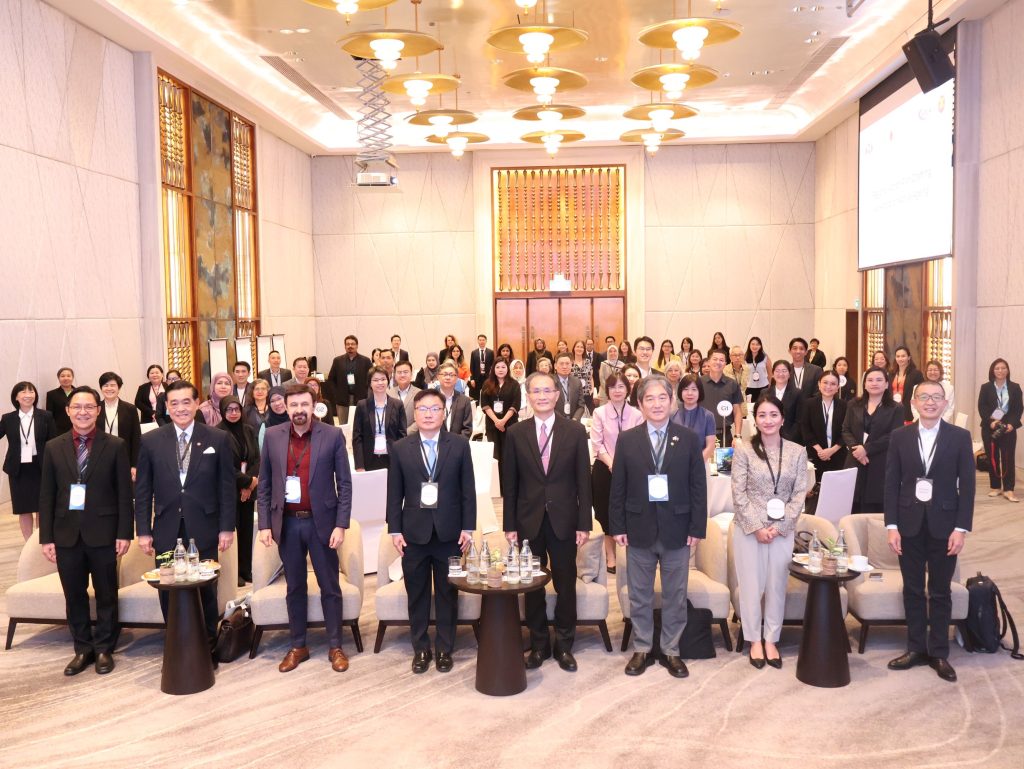
THAILAND, 8 September 2025 – For many in the ASEAN region, the future of ageing is not a distant concept but a present reality that requires proactive and strategic action. With ongoing demographic shifts, the need for a cohesive and comprehensive approach to active ageing has never been more urgent.
The ASEAN Centre for Active Ageing and Innovation (ACAI), with support of the Japan-ASEAN Integration Fund (JAIF), International Development Research Centre (IDRC), Economic Research Institute for ASEAN and East Asia (ERIA), and Japan International Cooperation Agency (JICA), recognised this by taking a critical step forward to host a two-day Regional Action Plan Drafting Workshop followed by the two-day field visit. This pivotal event is a direct response to the need for a unified strategy, bringing together Country Coordinators (CCs), ACAI-affiliated experts, and stakeholders from across ASEAN to draft a plan that will define the future of active ageing in the region.
The heart of the workshop lies in a powerful vision to create a cohesive and context-specific Regional Action Plan for Active Ageing. It is harmonising the global commitments with the diverse realities of ASEAN’s demographic, cultural, and socio-economic landscapes.
Dr. Sopon Iamsirithaworn, Alternate Chair of the ACAI Governing Board, stated during his remarks, “I encourage you to be evidence-driven and solution-oriented and bring forward what works in your countries, such as policies, financing models, service innovations, and community-based practices. Our work is anchored in the ASEAN Community Vision 2045 and in the Socio-Cultural Community’s commitment to a healthy population.”
He further highlighted that active ageing is central to ASEAN’s future, that we expect older persons to be healthier, more secure, more connected, and more empowered to contribute to a truly people-centred ASEAN.
The plan will be built upon a foundation of established international frameworks, including the Madrid International Plan of Action on Ageing (MIPAA), WHO Healthy Ageing, UN Decade of Healthy Ageing and Regional Plan of Action on Implementing the Kuala Lumpur Declaration on Ageing. However, the blueprint also draws from ASEAN’s own spirit of resilience and innovation.
By embedding the principles of the Declaration on Institutionalising the Resilience of ASEAN and its Communities and Peoples to Disasters and Climate Change into ageing policies, the workshop ensures that older persons are recognised as active contributors to resilient societies, not just passive recipients of care.
The workshop’s methodology is designed to be a journey of collaboration and practical learning. It began with each Country Coordinator presenting their national context, challenges, and strategies for active ageing. Participants were divided into four groups to delve into key thematic pillars of Health, Economic and Financial Security, Social Participation, and Environment. ACAI-affiliated experts offered technical insights and guidance, supporting CCs in developing policies tailored to their countries.
The journey culminates in a field visit to Map Ta Phut and Kled Kaew, two districts in Rayong Province, Thailand, to have a first-hand look at policy in action. Participants witnessed how the city of Map Ta Phut has created a community-based long-term care model that blends health services, social participation, and digital innovation. They saw how the Elderly Quality of Life Development Centre provides social engagement for active seniors and structured care for those who are homebound. From observing daily activities, such as dancing and crafting to learning about the use of Smart Living technology, the visit offered a tangible understanding of what a truly age-friendly environment can look like.
“Importantly, our field visit to Rayong would be a lively classroom to test assumptions, to learn how policies meet people, and return with ideas that are realistic, scalable, and sensitive to your own local context”, said Dr. Sopon.
The expected outcomes of this workshop are far-reaching. Beyond the preliminary draft of the Regional Action Plan, the event aims to foster a shared understanding of ageing issues and strengthen regional and national connections. It will also enhance the capacity of Country Coordinators and set the stage for future initiatives, including the upcoming Country Coordinators Training Workshop in Japan in October 2025. This workshop is a collective endeavour to build a future where every older person in ASEAN can live a life of dignity, security, and active contribution.
###
